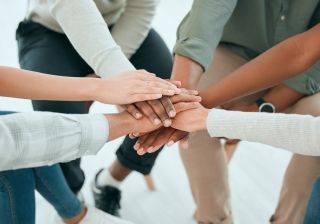Relationships
The Different Types of Relationships
Multiple relationships are good for us.
Posted February 4, 2024 Reviewed by Jessica Schrader
Key points
- Societal rules tell us that we should prioritise our romantic relationships, but it's not always beneficial.
- We are relational people so we need to connect to multiple different relationships to thrive.
- There is a rise in loneliness and mental health struggles because we tend to neglect important relationships.

We tend to associate the word “relationship” with romantic relationships; and when we think of romantic relationships, the first image that comes to mind is of two people in the relationship (a couple). Also, we often think that the couple is the most important relationship in a person’s life, unless the person has children.
All of these immediate associations we make about relationships are societal messages telling us how to think about relationships: what we should aspire to in a relationship, what a good relationship should look like, and what is deemed “weird” in relationships. These societal rules of relationships can be restrictive and prevent us from thriving in our lives. Mental health services are seeing a rise in demand for help because many people are struggling, and the rate of loneliness in the U.K. is high. Might those issues be because we are disconnected from important relationships?
Human beings are relational, so we need others to survive and thrive. However, in our modern Western world, we spend so much of our time pursuing more financial success, more status, and more material assets, and, in our love life, we continuously swipe left and right in search of “the one.” Yet, at the same time, we also de-prioritise other meaningful connections that can be crucial for our well-being.
So, let’s take a look at all the different relationships. As you read below, notice what relationships you have not paid enough attention to.
- Romantic relationships. They are highly prized in our society. If somebody is constantly single, it brings judgments in others: “Why can’t they find a partner? What’s wrong with them?” This judgment comes from what we call amatonormativity: the assumption that all human beings want to pursue a love and romantic relationship, usually in the context of monogamy. However, some people are aromantic, which means that they have no desire for romantic relationships. Yet, it doesn’t mean they are un-relational. Many single people and aromantic people might actually be very well connected in other types of relationships. Also, some who want a romantic relationship may not want a sexual relationship.
- Sexual relationships. Sometimes, people have a sexual and romantic relationship with the same person, and it is certainly our societal message of what a “good” relationship should look like, but it’s not always the case. Some people identify as “freysexual,” which describes the sexual attraction to strangers rather than people they know. By contrast, people who identify as “demisexual” tend to have sexual attraction only with people with whom they have established a relationship first.
- Family relationships. They are just as important as romantic and sexual relationships for some people. Some even prefer to hang out with family rather than being married to someone. There is nothing wrong with that. Some parents might focus on their children and de-prioritise their romantic and sexual relationships (which can be problematic). The term “family” may refer to “family of origin” or a “family of choice” made up of close friendships that feel like family. Sometimes, the “family of choice” may be more loving and caring than the family of origin. For many people, especially marginalised and queer people, a “family of choice” is essential for survival and thriving.
- Friendships. How many times have you heard that a friendship has been pushed aside to make room for a romantic relationship? It is important not to devalue friendships because they are as important as romantic relationships, and sometimes, even more important. Our friends can become our “family of choice” as explained above, and friendships are crucial for wellbeing and thriving. Some people might feel more comfortable sharing things with friends rather than romantic partners, and there is nothing wrong with that. If you find yourself neglecting your friendships, call a friend today and ask them how they are.
- Online relationships. They can often be dismissed and even judged as “bad” or “weird” especially if they end badly or if something went wrong. It is easy for people to blame the person for having an online relationship: “It’s not a real relationship, what did you expect?" The fact is that online relationships are absolutely real ones and they can be as intimate and profound as in-person relationships. Some people identify as digisexual to describe their primary attraction to relationships with technology. Indeed, some prefer to interact with another human through an electronic device, and it doesn’t mean they have an “avoidant attachment style.” Some online relationships are vital, especially for marginalised people or Queer people living in remote areas or villages. Finding our people and communities online can be a lifeline, and definitely better than isolation.
- Acquaintances. We often forget these kinds of relationships and treat them as insignificant but, for many, having a brief connection with a shop assistant or the barista making our coffee, sharing a smile, or even “How are you?” can make a huge difference in a person’s day and a sense of connection and being seen, which can have a tremendous positive effect on mental health. Why not share more smiles with each other?
- Work relationships/ colleagues. We often don’t choose these relationships, they just happen by sharing a desk or a job. Some of those relationships can be difficult and unpleasant, but many work relationships can be fun and turn into friendships. The benefit of good collegiate relationships is that our professional struggles and successes can be truly understood in a way that our friends or romantic partner(s) might not understand if they don’t work in the same profession.
- Location-based relationships We also don’t choose this type of relationship because they depend on our location; for example, where we live. We might not pay that much attention to our neighbours if things are calm but all of us have heard of horror stories with neighbours that make life miserable. So, they are important relationships to consider. Having people you know who live in proximity can be helpful in moments of need. In the U.K., and especially in cities like London, the culture is such that we don’t talk to neighbours. It’s a sad loss of opportunity for well-being.
- Teacher/student relationship. It is a special relationship where the teacher has potentially more power than the student, and therefore there needs to be careful consideration from the teacher not to misuse their power. Often teachers can play a crucial role and make a big difference in the trajectory of someone’s life. I have heard on several occasions clients say that when parents were neglectful and home was a horrible place to be, there was one teacher who noticed them and encouraged them to have a good life, which was pivotal in their wellbeing.
- Therapist/client relationship. It is another very special relationship with power that needs to be managed carefully to avoid harm. There is potent intimacy in the therapeutic relationship, yet it is a one-way relationship, where the client’s welfare is looked after by the therapist, but the client is not supposed to look after the therapist. There can be short or long-term therapeutic relationships, and they can have a lasting impact on someone’s life long after the relationship has ended.
- Health care professional/patient relationship. They are also one-way relationships, where the patient is not supposed to look after the health care professional. They are important relationships where the patient’s trust must be respected. Unfortunately, the current NHS structure makes it difficult for such relationships to develop properly. It is most health care professionals' wish to have a good relationship with their patients, but the current system doesn’t always allow it to happen. Sadly, not being able to trust a healthcare professional can cause significant distress.
- Community/faith-based/cultural group relationships. Having a sense of belonging in a community, faith-based or cultural group with like-minded people, with whom you feel safe and connected, may be a happy place for people’s well-being. It can make the difference between thriving compared to merely existing in loneliness.
- Relationship with pets. It is another relationship that tends to be dismissed so much so that people who profoundly grieve after their pets’ death are ridiculed, dismissed, and are not even recognised as having a good enough reason to take compassionate leave from work. Yet, relationships with pets are very important, and some people prefer to be around animals rather than human beings. There is nothing wrong with that. Pets can offer just as much meaningful connection, fun, and companionship as humans, and they are non-judgmental.
As you can see, there are multiple ways that we can make meaningful connections with others. Don’t feel restricted to focus only on one type of relationship (usually the romantic one). Make room for many different types of relationships, because they are all important, and they can offer something different, meeting our diverse needs. Multiple good relationships can be a huge benefit to our mental health. So, let’s get connected.


